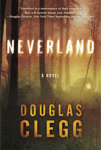Neverland
Douglas Clegg
Vanguard Press
Trade Paper, 304 pages, $15.95
Review by Sheila Merritt
“When you stand at the border of the land and sea, it is clear where one leaves off and the other begins. But where lies the boundary between the perceived world and the imagined?” Welcome to Neverland, where substance and shadow shift and blur. In Douglas Clegg’s novel, reality and fantasy become dangerously intertwined. Harsh adult truths merge with children’s escapist games to form a frightening alliance in this finely crafted and astute book.
Clegg sets the tale during a sweltering and suffocating Southern summer. It is a time of frayed nerves, strong emotions, and unearthed secrets. Innocence is tested, as the imagination of youth wavers on the precipice of cynicism. The story is told in flashback, through the memories of first person narrator Beau. He recalls that at age 10, life radically changed during a family vacation.
Beau’s parents and three siblings are joined by an aunt and uncle, and their son, Sumter, for a gathering at the island home of Grandmother “Weenie” Rowena. On the grounds of the house is a dilapidated shed, which becomes a clubhouse for Sumter and Beau. There they flee from the discordant universe of grown-ups: from the abuse of alcohol; the yelling; the seething tension. In this makeshift haven, Sumter seemingly conjures an entity called Lucy. Hypnotic hallucinatory sensations subsequently occur. Psychologically seduced into a realm of supernatural possibilities, the two boys, and Beau’s older twin sisters, embrace the lore of Lucy. Veils of hidden horrors start to fall, and the discoveries lead to revelation: “Everything in childhood gets out of hand.”
What Sumter taps into is at once liberating and stifling; there is empowerment, but there are also constraints and demands. Justifiably angry and distrustful of the adults around him, he tyrannically wields his inherited psychic weaponry with a vengeance. A pint-sized abuser of power, Sumter nonetheless covets acceptance and love. His vacillating feelings run feverishly high; he is eerie as hell. Another exceedingly creepy kid, Zinnia, is also part of the Neverland community. Her presence markedly chills the blood: “Even through the rain her smell was strong: the stench of barnacles and dead bluefish, the rotting timber of docks, the damp seaweed buzzing with flies.”
Zinnia awakens warring reactions in Beau; she simultaneously repulses and attracts him. His perceptions of Sumter are similarly conflicted: Beau loathes his cousin’s monstrous penchant for sadism, yet understands it; can recognize within himself potential for such destructively peevish behavior. He comprehends the casual cruelty that inherently exists among the young. This allows the narrator to see the depth of despair beneath Sumter’s scary surface: “He looked very sad and very small and reminded me of baby birds I had seen fall from trees and die just as they were being born.”
Douglas Clegg’s prose is stunningly poetic and strikingly wise. He appreciates callow purity; but doesn’t sentimentalize childhood. Profoundly insightful, Clegg is clear eyed about his characters’ behavior and motivations. Neverland, even so, is a place of tempestuous excitations and wild whimsical whirlwinds. Intensified by the brilliant illustrations of Glenn Chadbourne, this trade paper edition entices the reader to make the journey: Back to youth; back to its mysteries; back to Neverland.









